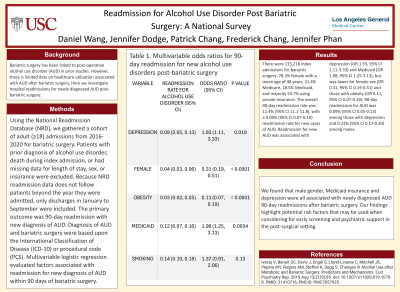Sunday Poster Session
Category: Interventional Endoscopy
P1064 - Readmission for Alcohol Use Disorder Post Bariatric Surgery: A National Survey
Sunday, October 27, 2024
3:30 PM - 7:00 PM ET
Location: Exhibit Hall E

Has Audio

Daniel Wang, MD
Keck School of Medicine of the University of Southern California
Torrance, CA
Presenting Author(s)
Daniel Wang, MD1, Jennifer L. Dodge, MPH2, Patrick Chang, MD1, Frederick Chang, DO3, Jennifer Phan, MD1
1University of Southern California, Los Angeles, CA; 2Keck School of Medicine of the University of Southern California, Los Angeles, CA; 3University of Arizona, Phoenix, AZ
Introduction: Bariatric surgery has been linked to post-operative alcohol use disorder (AUD) in prior studies. However, there is limited data on healthcare utilization associated with AUD after bariatric surgery. Here we investigate hospital readmissions for newly diagnosed AUD post-bariatric surgery.
Methods: Using the National Readmission Database (NRD), we gathered a cohort of adult (≥18) admissions from 2016-2020 for bariatric surgery. Patients with prior diagnosis of alcohol use disorder, death during index admission, or had missing data for length of stay, sex, or insurance were excluded. Because NRD readmission data does not follow patients beyond the year they were admitted, only discharges in January to September were included. The primary outcome was 90-day readmission with new diagnosis of AUD. Diagnosis of AUD and bariatric surgery were based upon the International Classification of Disease (ICD-10) or procedural code (PCS). Multivariable logistic regression evaluated factors associated with readmission for new diagnosis of AUD within 90 days of bariatric surgery.
Results: There were 133,218 index admissions for bariatric surgery: 78.3% female with a mean age of 48 years, 21.4% Medicare, 18.5% Medicaid, and majority 53.7% using private insurance. The overall 90-day readmission rate was 11.4% (95% CI 11.1-11.8), with a 0.09% (95% CI 0.07-0.10) readmission rate for new cases of AUD. Readmission for new AUD was associated with depression (OR 1.93, 95% CI 1.11-3.33) and Medicaid (OR 1.98, 95% CI 1.25-3.13), but was lower for female sex (OR 0.31, 95% CI 0.19-0.51) and those with obesity (OR 0.11, 95% CI 0.07-0.19). 90-day readmission for AUD was 0.09% (95% CI 0.05-0.13) among those with depression and 0.23% (95% CI 0.17-0.30) among males.
Discussion: We found that male gender, Medicaid insurance and depression were all associated with newly diagnosed AUD 90-day readmissions after bariatric surgery. Our findings highlight potential risk factors that may be used when considering for early screening and psychiatric support in the post-surgical setting.
Note: The table for this abstract can be viewed in the ePoster Gallery section of the ACG 2024 ePoster Site or in The American Journal of Gastroenterology's abstract supplement issue, both of which will be available starting October 27, 2024.
Disclosures:
Daniel Wang, MD1, Jennifer L. Dodge, MPH2, Patrick Chang, MD1, Frederick Chang, DO3, Jennifer Phan, MD1. P1064 - Readmission for Alcohol Use Disorder Post Bariatric Surgery: A National Survey, ACG 2024 Annual Scientific Meeting Abstracts. Philadelphia, PA: American College of Gastroenterology.
1University of Southern California, Los Angeles, CA; 2Keck School of Medicine of the University of Southern California, Los Angeles, CA; 3University of Arizona, Phoenix, AZ
Introduction: Bariatric surgery has been linked to post-operative alcohol use disorder (AUD) in prior studies. However, there is limited data on healthcare utilization associated with AUD after bariatric surgery. Here we investigate hospital readmissions for newly diagnosed AUD post-bariatric surgery.
Methods: Using the National Readmission Database (NRD), we gathered a cohort of adult (≥18) admissions from 2016-2020 for bariatric surgery. Patients with prior diagnosis of alcohol use disorder, death during index admission, or had missing data for length of stay, sex, or insurance were excluded. Because NRD readmission data does not follow patients beyond the year they were admitted, only discharges in January to September were included. The primary outcome was 90-day readmission with new diagnosis of AUD. Diagnosis of AUD and bariatric surgery were based upon the International Classification of Disease (ICD-10) or procedural code (PCS). Multivariable logistic regression evaluated factors associated with readmission for new diagnosis of AUD within 90 days of bariatric surgery.
Results: There were 133,218 index admissions for bariatric surgery: 78.3% female with a mean age of 48 years, 21.4% Medicare, 18.5% Medicaid, and majority 53.7% using private insurance. The overall 90-day readmission rate was 11.4% (95% CI 11.1-11.8), with a 0.09% (95% CI 0.07-0.10) readmission rate for new cases of AUD. Readmission for new AUD was associated with depression (OR 1.93, 95% CI 1.11-3.33) and Medicaid (OR 1.98, 95% CI 1.25-3.13), but was lower for female sex (OR 0.31, 95% CI 0.19-0.51) and those with obesity (OR 0.11, 95% CI 0.07-0.19). 90-day readmission for AUD was 0.09% (95% CI 0.05-0.13) among those with depression and 0.23% (95% CI 0.17-0.30) among males.
Discussion: We found that male gender, Medicaid insurance and depression were all associated with newly diagnosed AUD 90-day readmissions after bariatric surgery. Our findings highlight potential risk factors that may be used when considering for early screening and psychiatric support in the post-surgical setting.
Note: The table for this abstract can be viewed in the ePoster Gallery section of the ACG 2024 ePoster Site or in The American Journal of Gastroenterology's abstract supplement issue, both of which will be available starting October 27, 2024.
Disclosures:
Daniel Wang indicated no relevant financial relationships.
Jennifer Dodge indicated no relevant financial relationships.
Patrick Chang indicated no relevant financial relationships.
Frederick Chang indicated no relevant financial relationships.
Jennifer Phan indicated no relevant financial relationships.
Daniel Wang, MD1, Jennifer L. Dodge, MPH2, Patrick Chang, MD1, Frederick Chang, DO3, Jennifer Phan, MD1. P1064 - Readmission for Alcohol Use Disorder Post Bariatric Surgery: A National Survey, ACG 2024 Annual Scientific Meeting Abstracts. Philadelphia, PA: American College of Gastroenterology.
